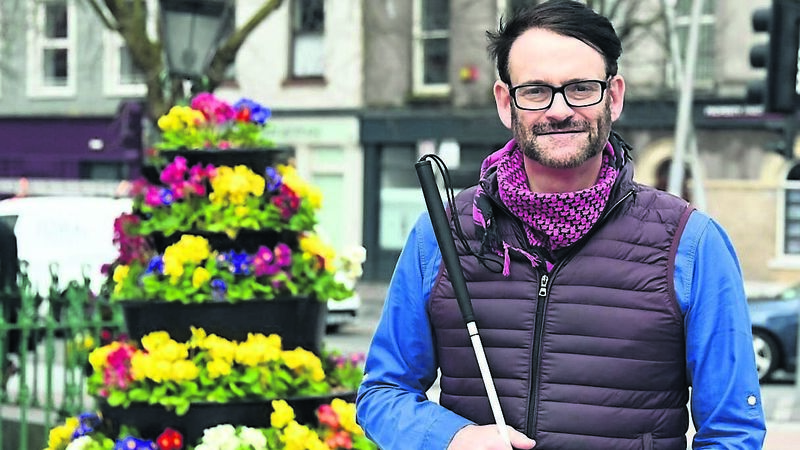Cork Views: Our city footpaths are such a risk for walkers

Robert Fourie: “I have no desire to retreat from the city I live in and love”
I love Cork city: the buzz of Patrick Street on a Saturday, the spillover of voices from cafés, the friendly greetings of traders who know me by name.
I live in the South Parish, and it is a privilege to pay taxes here and to participate in the social life of this vibrant, evolving place.
Like everyone else, I have the right to move through our public spaces freely, safely, and with dignity.
Lately, that dignity has been under threat.
I am blind, and although my orientation and mobility skills are quite sound, there is only so much I can do when a motorised vehicle hurtles along the footpath and shoves me aside.
That happened recently on Patrick Street: a rider on a powered scooter barged past from behind, barking “Outa the way!” before vanishing into the crowd. I had no time to react and could not even hear them coming, yet I was treated as an obstruction.
This was not an isolated event. Cork, like many cities, has seen a surge in the use of electric bikes and scooters in recent times.
Some of them are food deliverers, pressed to meet strict delivery windows, but many of them seem to be in a rush, and illegally cut across public footpaths to save a few seconds.
I have been brushed by handlebars and felt the rush of air as a bike passed far too closely to my body. Seldom have I heard a bell or a warning, just felt the surge of adrenaline in my heart.
And it is not confined to footpaths. Increasingly, electric bikes and scooters also race through red lights.
More than once, I have stepped onto a pedestrian crossing with the green man showing, and felt a wheel skim my white cane millimetres away.
For me, and for others who cannot see danger coming, this turns every junction into a frightening gamble with our own safety.
I don’t hold the ones who are delivery workers wholly to blame by the way. They are earning a living within systems that prioritise profit, speed and efficiency over public safety.
The technology has moved faster than the law, enforcement is inconsistent, and those of us on foot are often left to carry the risk.
When harm does occur, the official response can feel inadequate.
For instance, media reports last year highlighted an incident in Dublin where a pedestrian suffered serious injuries following a collision with a motorised bike on a footpath. The case raised urgent questions about legal grey areas and the difficulty of ensuring proper follow-up in such events.
Although new legislation regulating powered bikes and scooters has recently come into effect, enforcement is still finding its footing. Gardaí are working within a system that is evolving, but their capacity to protect vulnerable pedestrians appears limited.
Regardless, if a motorised bike strikes me, we all know who will come off second best.
I know the image is stark, even shocking, but it has come down to this: I am pleading for my own life and limb, and for the lives of other blind pedestrians.
Footpaths are a shared trust. Our taxes fund them, and each of us has the same claim to their safety.
When people on powered bikes and scooters go too fast on footpaths, it gambles with the wellbeing of every person who walks there.
No-one, least of all those who are blind or disabled, should step outside wondering whether they will return home whole; or even whether they will ever see their families again.
There is another point worth stating clearly.
Cyclists, whether on electric or manual bikes, are required to dismount when entering pedestrian footpaths. That law exists to prevent harm.
The responsibility lies with those holding the handlebars to be alert, respectful, and fully aware of the people around them, especially if they are more vulnerable pedestrians.
Cork could lead the way. We could equip Gardaí with electric bikes of their own to patrol crowded pedestrian areas and respond quickly to misuse of public space.
We could strengthen legislation to ensure that motorised bikes and scooters stay on the roads and in cycle lanes, and ensure that meaningful penalties are imposed when the law is broken.
But, more importantly, we need to cultivate a renewed ethic of care.
Shared public space only works when every person is considered.
I have no desire to retreat from the city I live in and love. I want to keep shopping at the market, sharing coffee with friends, and soaking up Cork’s Saturday buzz.
I also want people who move at a different pace, whether they use a cane, wheelchair, walker, or simply walk more slowly, to feel equally welcome and safe.
Public wellbeing and safety must come first.
The right to feel secure and included in our shared spaces is the most basic civic promise, and it belongs to every one of us.







 App?
App?




